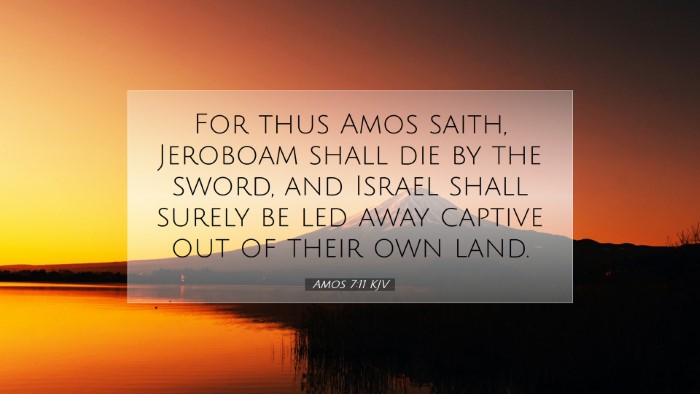Old Testament
Genesis Exodus Leviticus Numbers Deuteronomy Joshua Judges Ruth 1 Samuel 2 Samuel 1 Kings 2 Kings 1 Chronicles 2 Chronicles Ezra Nehemiah Esther Job Psalms Proverbs Ecclesiastes Song of Solomon Isaiah Jeremiah Lamentations Ezekiel Daniel Hosea Joel Amos Obadiah Jonah Micah Nahum Habakkuk Zephaniah Haggai Zechariah MalachiAmos 7:11
Amos 7:11 KJV
For thus Amos saith, Jeroboam shall die by the sword, and Israel shall surely be led away captive out of their own land.
Amos 7:11 Bible Commentary
Amos 7:11 - Commentary Overview
Amos 7:11 states:
"For thus Amos saith, Jeroboam shall die by the sword, and Israel shall surely be led away captive out of their own land."
Contextual Background
The prophet Amos delivers this message during a time of relative prosperity for Israel; however, it is prosperity marred by social injustice and spiritual indifference. His emphasis on judgment serves as a warning against complacency.
Insights from Commentators
Matthew Henry's Commentary
Matthew Henry emphasizes the gravity of Amos's proclamation. He notes that Amos did not fear the consequences of delivering such a stern message. Highlighting Jeroboam II's reign, Henry points out that while the nation experienced military success, the underlying corruption and idolatry would not escape divine judgment. Amos's words are prophetic, indicating that the social policies and injustices of the leadership will lead to dire consequences.
Albert Barnes' Notes
Albert Barnes provides a detailed interpretation of the prophecy's implications. He observes that the name Jeroboam is emblematic of the twofold judgment awaiting Israel. Firstly, the king's violent demise symbolizes the end of sin-infatuated leadership, while the captivity sentence refers to the collective punishment of the nation. Barnes stresses that Amos's prophecy conveys not only historical truth but also timeless spiritual principles about accountability and the certainty of divine judgment.
Adam Clarke's Commentary
Adam Clarke enriches the discussion by elaborating on the broader theological implications of captivity. He suggests that the announcement serves as an irrevocable seal on the nation's fate, forewarning that moral decay leads inexorably to spiritual exile. Clarke also challenges readers to reflect upon their personal and communal morality, suggesting that this passage serves both as a warning and an invitation to repentance.
Theological Reflections
In synthesizing these insights, we see that Amos 7:11 calls for deep reflection regarding leadership and moral integrity. The prophetic message warns that God's justice cannot be circumvented—national sins invite national consequences. The themes of accountability resonate through Christian theology, reminding leaders and believers alike that righteousness must underpin governance and personal conduct.
Application for Today's Readers
- Self-Examination: This passage invites a rigorous self-examination of our own lives and our contributions to society. Where might we be complicit in injustice?
- Leadership Accountability: It serves as a call for leaders to foster integrity, honesty, and moral courage in their actions.
- Warning Against Complacency: The need for vigilance against spiritual apathy is critical; prosperity can lead to spiritual blindness.
- Urgency of Repentance: The prophetic nature of the text emphasizes the need for repentance as a means of restoration before facing judgment.
Conclusion
Amos 7:11 stands as a powerful testament to the interplay between divine justice and human conduct. By delving into the insights provided by Matthew Henry, Albert Barnes, and Adam Clarke, we are reminded that prophetic literature is not merely about foretelling future events but also about offering timeless truths applicable to every generation. As such, it remains relevant to pastors, scholars, and anyone seeking to align their life with the principles of justice and righteousness which God cherishes.


